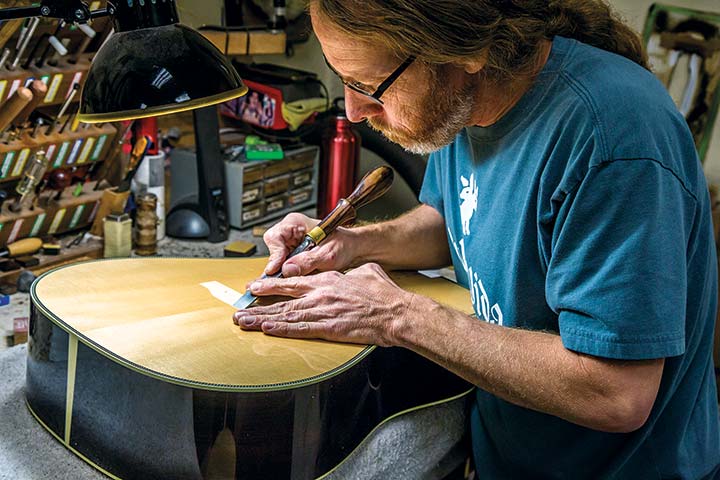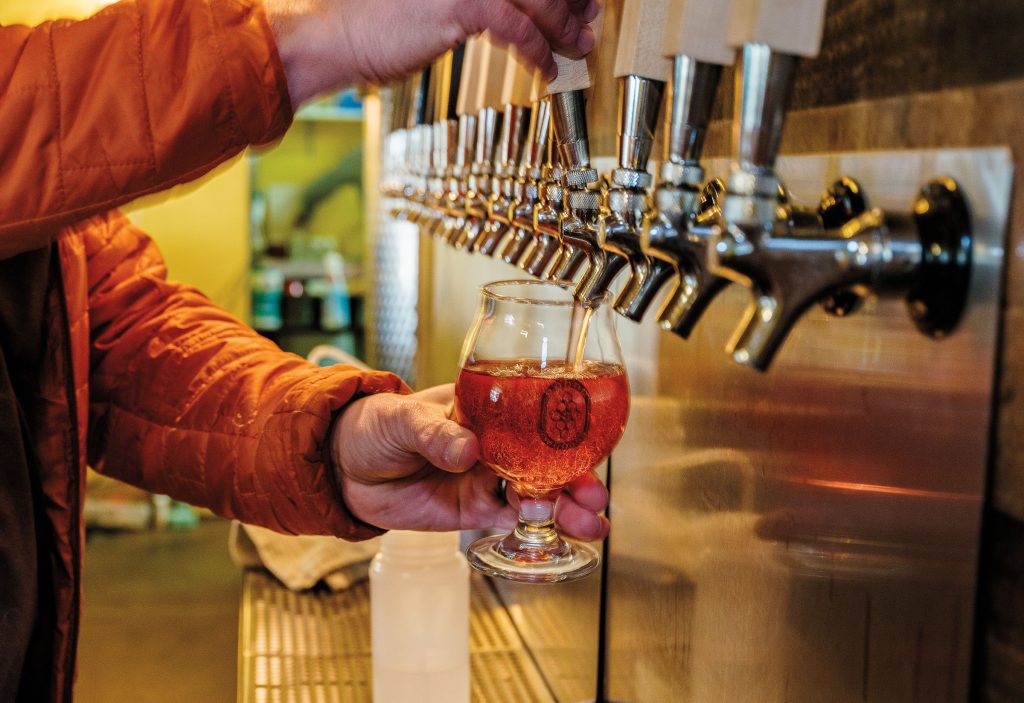
It’s the smell that first grabs you when you enter the Collings Guitars Factory in southwest Austin—that heady intermingling of hand-milled spruce, mahogany, rosewood, maple, and other high-end tonewoods, layered with the pungently pleasing odor of varnish and lacquer.
Collings Guitars is at 11210 W. US 290 in Austin. Free tours take place most Fridays at 3:30 and last 60-90 minutes. Call in advance to reserve your spot: 512/288-7776; www.collingsguitars.com.
This is the birthplace of every stringed instrument conceived by master luthier Bill Collings over the past 10 years. The 28,000-square-foot facility employs nearly 100 people and is Collings’ third shop since he moved to town in the mid-1980s. It produces some of the finest hand-crafted guitars, mandolins, and ukuleles on the planet.
An occasional picker himself, the Ohio native originally planned to be a doctor, but after fashioning his first guitar from a cigar box and rubber bands at age 14, he found himself haunted by the structure and sound, and magic, of guitars. Collings made his second instrument about a decade later, using a handsaw and hammer and chisel on his dining room table. By then, he’d moved to Houston and was working in a machine shop, repairing guitars on the side. After he built an acoustic for a local musician, word spread, and soon a young and yet-unknown Lyle Lovett asked him for one.
Over time, Collings built and sold some 50 guitars while still living in Houston. He headed west to Austin and eventually outfitted an old masonry shop. The rest is luthier history. These gems are lovingly honed from start to finish, created by the hands of almost two dozen artisans over the course of 50 hours. Each is its own creation, beginning with the lengthy seasoning of woods and ending with hand-sanding, lacquering, and stringing of the instruments.
For these reasons, a Collings has become a highly prized possession over the past 35 years. They’ve rested in the hands of giants like Keith Richards, Eddie Van Halen, and Brian May. They are not cheap: The starting price for an acoustic hovers around $3,500. But if you’re simply interested in learning the details of their fabrication, that much you can get for free on a tour of Collings’ fascinating production facility.
When I arrive, the vestibule in front of the shop is crowded with people who’ve come for the weekly Friday afternoon tour, a nearly two-hour odyssey.
Our tour guide, Chase Matkin, leads us to our first stop: the acclimating room, where tall metal shelving holds precious billets and sheaths of wood, which have been selected, cured, and acclimated to the workshop by wood specialists Bruce VanWart and Aaron Huff. They are kept at 49 percent humidity, at a temperature of 70 degrees.
“We use sustainable sources from small suppliers from all around the world. That allows us to pick premier woods,” Matkin explains. He pulls fragrant samples from the shelves: a quilted maple that will be used to adorn the mahogany body of an electric guitar, a small piece of African ebony for the fingerboard of a mandolin. One plank has the shape of an electric guitar outlined lightly in pencil.
We move on to the build rooms and mill, where men and women are chiseling and working with individual pieces, such as the bracings for the soundboard (the top) of an acoustic guitar; others are sanding the wood to precision thickness. The din of lathes, bandsaws, and other machines sets a certain rhythm for this dedicated crew, who move back and forth between the machinery and their work stations, which are personalized with kitschy figurines, vintage calendars, magazine photos of guitar heroes, pithy quotes, and cartoons. In the mill, artisans monitor the movement of wood through the Computer Numerically Controlled (CNC) machines, which employ 3-D modeling to carve and rout the major parts, such as the sides and backs of an instrument, the fingerboards and necks, bridges, and saddles. All will later be carefully honed and hand assembled.
Just outside the acoustic-build room, a craftsman wearing safety glasses operates the side-bending machine—a heated device that slowly shapes the side panels for each instrument. Bill Collings designed this contraption, along with many others in the shop, himself. Inside the acoustic-build department, other workers are bracing the backs and tops of instruments, while others are drum-sanding various pieces to sleek perfection. I watch a young woman gluing layers of guitar-shaped wood together, then I move on to observe another employee intently smoothing a teensy bump of glue with a mechanized sander.
In the acoustic neck department, several individuals are contouring fingerboards, inlaying frets, or affixing necks to bodies. In the electric guitar, mandolin, and ukulele departments, similar painstaking care is paid to each nuance. At one point, I notice that Collings has popped in and is looking over the shoulder of an artisan; the two are deep in discussion over some fine detail.
By now, the tour is well past 80 minutes long, and Matkin leads the knot of guests to the finish department, where lush sunbursts and other finish treatments complete the unique look, feel, and sound of each Collings. One artisan is lacquering the quilted maple of an I-35 Deluxe electric to a deep “merlot.” In the very last area—the set-up room—all instruments come to rest for a three-day period, where they settle like fine wine; here, if need be, final adjustments to string tension and other components are made.
At this point, musician/geeks like my husband gaze around at the dazzling instruments, contemplating a way to acquire one of these beauties—be it a UT-1 tenor uke, a jazzy arch-top acoustic, or a 14-fret dreadnought acoustic. But as the Collings folks make clear up front, you can’t just come to the factory and buy one; you have to purchase a Collings through an authorized dealer. And typically, you have to wait a few months till it’s ready.
Yet, the incredible journey of these jewels makes them Lone Star originals, and revered commodities among the world’s best musicians. Diverse talents like Lovett, Pete Townshend, Joni Mitchell, Paul Simon, Charlie Sexton, Robert Plant, Bill Frisell, and Lloyd Maines share at least one thing: They own a Collings.








